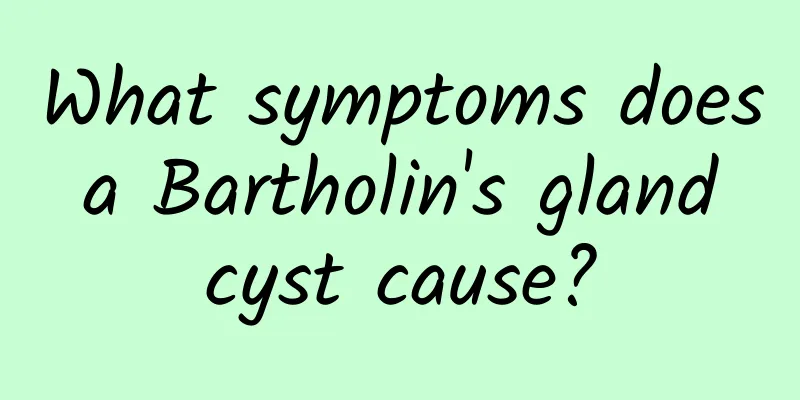What symptoms does a Bartholin's gland cyst cause?

|
Bartholin's gland cysts may cause local swelling, pain, discomfort during sexual intercourse, and may lead to secondary infection in severe cases. Treatment options include medication, surgery, and daily care. 1. Common symptoms of Bartholin's gland cyst Bartholin's gland cyst is a cystic tumor formed by the accumulation of secretions due to the obstruction of the Bartholin's gland duct. There may be no obvious symptoms in the early stage, but as the cyst grows, the patient will feel swelling and pain in the vulva, especially when walking or sitting for a long time. Discomfort may also occur during sexual intercourse. If the cyst is infected, it may develop into a Bartholin's gland abscess, which manifests as local redness, swelling, heat and pain, and even systemic symptoms such as fever. 2. Treatment of Bartholin's gland cyst 1. Drug treatment: For infected cysts, doctors usually prescribe antibiotics, such as cephalosporins, amoxicillin, etc., to control the infection. Anti-inflammatory ointments, such as erythromycin ointment, can be used locally to relieve symptoms. 2. Surgical treatment: For recurrent or large cysts, surgical treatment is recommended. Common surgical methods include cystostomy and cystectomy. Ostomy is to drain the secretions by cutting the cyst, which is less traumatic; resection is to completely remove the cyst, which is suitable for patients with recurrent infections. 3 Daily care: Keep the vulva clean and dry, avoid wearing tight clothes to reduce friction. Avoid spicy and irritating foods, and eat more foods rich in vitamins, such as fresh fruits and vegetables, to enhance immunity. 3. Prevention and precautions The key to preventing Bartholin's gland cysts is to avoid vulvar infection and irritation. Wash the vulva regularly and use mild cleaning products. Pay attention to hygiene during sex and avoid unclean sexual behavior. If you find abnormal lumps or pain in the vulva, you should seek medical attention in time to avoid delaying treatment. Although Bartholin's gland cysts are common, timely treatment and daily care can effectively relieve symptoms and prevent recurrence. If an infection occurs or the cyst is large, it is recommended to see a doctor as soon as possible to avoid worsening of the condition. |
<<: Can I get pregnant with moderate cervical erosion?
>>: What to do about functional uterine bleeding
Recommend
Diet therapy for vaginitis
Vaginitis is a gynecological disease that is pron...
Can I have acupuncture during menstruation? Generally it is not recommended
Acupuncture is generally not recommended during m...
How can we completely cure cervical erosion? Two conventional treatments for cervical erosion
Conventional treatments for cervical erosion 1. D...
Beware! Women with frequent back pain should beware of pelvic inflammatory disease
Pelvic inflammatory disease is a common gynecolog...
What is the age range for menopause?
48 years old is indeed in the menopausal age rang...
How does Gongjingyankang suppository treat cervical erosion? Methods of traditional Chinese medicine to treat cervical erosion
Cervical erosion is a common disease among women....
How to prevent cervical warts
Cervical condyloma acuminatum has a strong abilit...
I would like to ask the experts how to deal with cervical erosion and bleeding?
How to deal with cervical erosion bleeding is wha...
Help you understand the causes of ectopic pregnancy
Ectopic pregnancy is a common gynecological disea...
What will happen if uterine fibroids are not treated properly? What are the complications of uterine fibroids?
The harm of uterine fibroids to women is mainly t...
Easily slim and get curves! How to make Korean kimchi light meal
Tired of the same old bento lunch? It is actually...
What is pelvic inflammatory disease in traditional Chinese medicine? Which acupoints can be massaged to treat pelvic inflammatory disease?
What is pelvic inflammatory disease in traditiona...
Diet can reduce the harm caused by menopause
Everyone needs to pay attention to the occurrence...
What are the examination items for congenital absence of vagina?
Women do not want to have gynecological diseases,...
How to prevent spontaneous abortion
Spontaneous abortion is a common gynecological pr...









